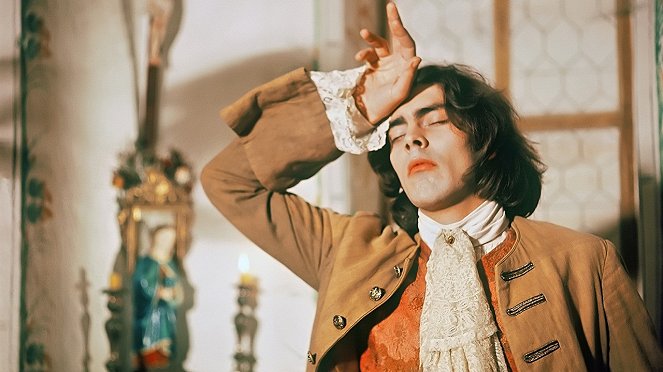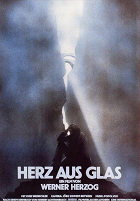Réalisation:
Werner HerzogPhotographie:
Jörg Schmidt-ReitweinMusique:
Popol VuhActeurs·trices:
Josef Bierbichler, Stefan Güttler, Sonja Skiba, Werner Herzog, Clemens Scheitz, Volker Prechtel, Wolfram Kunkel, Brunhilde Klöckner (plus)Résumés(1)
Hias, un berger, est sollicité pour rendre service à des paysans. Ceux-ci sont désemparés car à la suite du décès du contremaître de la verrerie du village, seule source de richesse de la région, le secret de la fabrication du verre s'est perdu. (texte officiel du distributeur)
Critiques (2)
Un autre des "films historiques" de Herzog, mais tout comme les autres, le film ne cherche pas à recréer fidèlement l'époque (et ici, il ne cherche même pas à construire une histoire !). Le passé allemand de la fin du XVIIIe et du début du XIXe siècle lui sert à saisir le tournant, le changement que la culture européenne de l'époque a apporté dans la vie de tous - les films de Herzog sont peuplés de personnages irrationnels de l'ère prémoderne, croyant aux prophéties, aux superstitions, aux rituels, des personnes si différentes de nous, les "modernes". Et c'est précisément cette période de changement, ou plutôt juste avant ce changement (la révolution industrielle, la modernité, etc.), sur laquelle le réalisateur se concentre (et à laquelle il fait clairement référence dans la scène d'ouverture, évoquant les images de l'époque romantique de Caspar David Friedrich). C'est précisément cette période précédant le grand bouleversement historique qui lui sert d'image de ce que l'Europe et chaque individu ont irrévocablement perdu - que ce soient les forêts, les tremblements mystiques en entendant les prophéties d'un berger génial, ou le verre rubis, qui sert à l'intérieur du film comme une métaphore de ces pertes.
()
Werner Herzog, the creator of the fascinating Fitzcarraldo and Aguirre, the Wrath of God, is a maverick, an original who ignores the audience's response and makes his own films. This one was preceded by a rumour that the actors involved in it were hypnotised, which is of course gossip, but it really seemed that way, given how stiffly they deliver their lines and how unnatural they seem in their acting. The film does have a captivating "Herzog" atmosphere, with a brutally slow-moving plot and plenty of absurd situations that look truly bizarre. The villagers walk around like zombies cut out of a Romero film, two guys sit at a table opposite each other in a tavern and with a completely impassive expression, without a single word or meaning to the plot, pull each other's hair, pour beer on each other, and smash glasses over each other's heads and talk about it, as they lie on top of each other, then another guy with a stiff motion and a fan of cards in his hand goes to look at the fire and then comes back again without a word, some villager dances with his dead friend, and to top it all off, constant cuts to an emaciated old man in a chair, etc. etc. Some may call it paintings with philosophical overtones, others may be genuinely amused, some may even be disgusted. The plot revolves around a village glassworks and the search for the recipe of the glassworks' signature product – ruby glass – which a local took with him to the grave. Everything is watched from afar and the story is essentially guided by a character who lives in the mountains, can predict the future and spews out one philosophical idea after another. The story is refreshed by shots of magically beautiful natural scenery (the ones in the opening are deliberately as if from a faulty filmstrip) accompanied by impressive music. All together, they form a whole that can bore someone to death with its narrative style and make another stare at the screen in fascination. For me it's something in between, that's why I give it a neutral 3*. Really hard to judge.
()
Photos (3)
Photo © Werner Herzog Filmproduktion


Annonces